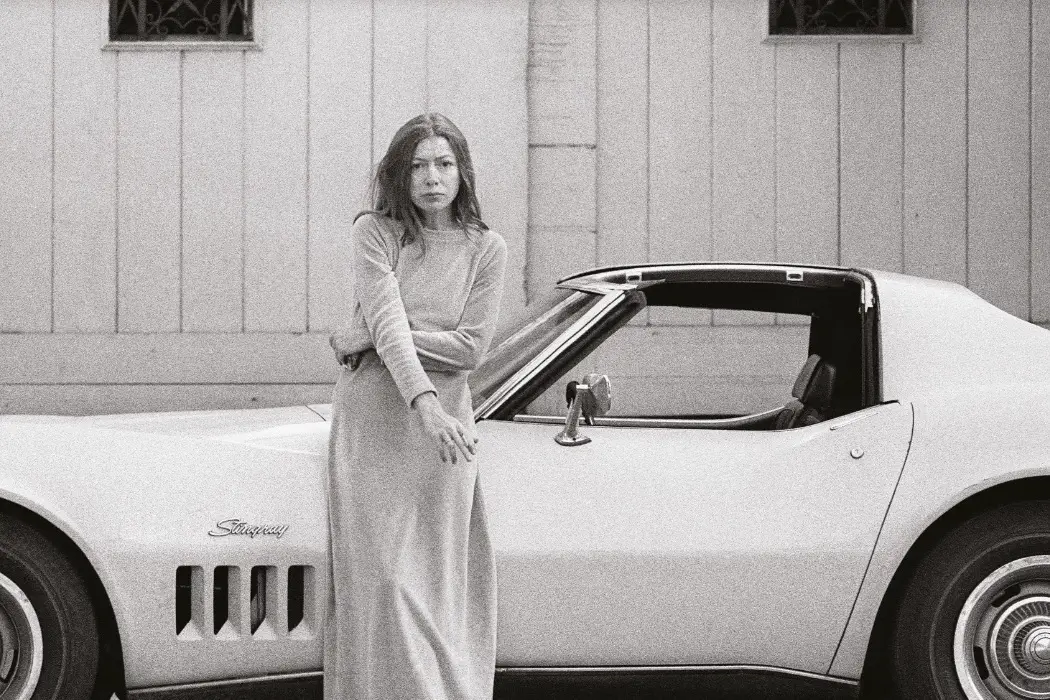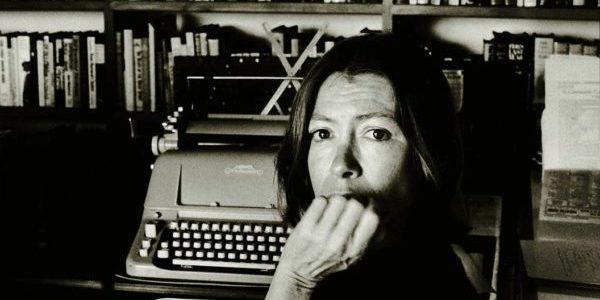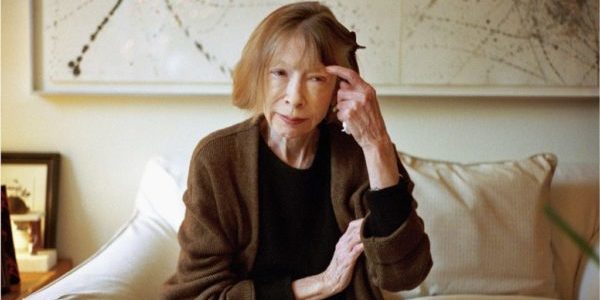JOAN DIDION: THE CENTER WILL NOT HOLD: A Starter’s Guide To An Icon

Midwesterner, movie lover, cinnamon enthusiast.
Writing about Joan Didion, one of America’s greatest writers, is odd. The stature of her work doesn’t necessarily dissuade me from writing, but it puts the act of writing into perspective. Even her lesser praised essays possess a clarity carved by someone who is clearly using different tools than everyone else.
Griffin Dunne, the director of Joan Didion: The Center Will Not Hold and nephew of its namesake, must have approached his subject with a similar spirit. Though she’s made a career out of the personal essay, Didion remains an enigmatic figure, and capturing her life and career wholesale seems like a terribly daunting task.
Biting Off More Than It Can Chew
Unsurprisingly, that approach ends up being the problem with The Center Will Not Hold. A Joan Didion documentary, in the abstract, is a welcome topic, but here Dunne sets out to capture some overarching sense of her life, which seems destined for a preliminary perusal of the author. Given Didion’s prolific legacy and influence as a writer, her intriguingly closed-off temperament and the incredible personal tragedies she’s endured, trying to cover it all is casting too wide a net.

The film starts with Didion’s marriage to fellow writer John Gregory Dunne. Their relationship and dynamic as both life partners and writing partners cements a foundation for the documentary. This isn’t about Didion’s entire life, but her adult life as a writer, partner and mother. Once that foundation is in place, Dunne quickly introduces a structure using a nice visual device. We’re lead through her life one book at a time, marked by pretty insert shots of the book’s original printing. This sets up an expectation for the audience, that we’ll be charting her life using through a two-pronged approach: the writing and influence of each book as well as what was going on in Didion’s life at that time.
Oddly, Dunne muddies this concept almost as soon as he starts it. We’re introduced to a book by one of John Gregory Dunne’s old coworkers — as an introduction to John, himself — and then, as the film continues to focus on Joan’s husband, we’re shown one of his own books, before going back to Didion’s work. Each book acts as a chapter of sorts, but Dunne is quick to bring us down side streets via books that pull the focus from Didion. As a result, the viewers are left without a real frame of reference for what the film wants to do or where it wants to go.
Additionally, the film’s title doesn’t is confusing. Didion used it in one of her most famous essays, “Slouching Towards Bethlehem,” as a potent statement about the sociopolitical climate of America during the late 1960s. The Center Will Not Hold is not a political film. Of course, the film could’ve been — Dunne could’ve discussed how relevant Didion’s political work remains in our current state. He actually includes a great line of hers about American politics being like a self-sufficient mechanism that’s detached from everyday life, yet also dictates how American life can and cannot be lived, but Dunne only seems interested in passing mention of her impact in this capacity.

The very last image of the film is an insert that says “Readings from the Works of Joan Didion” and lists all of her pieces the film touches on. Though certainly not as catchy, that title seems more fitting for this film than “The Center Will Not Hold,” considering it ends up being more useful as a starter pack for potential Didion fans than anything else.
A Willing Participation
The film will, however, be of interest to longtime fans due to her willing participation. Though Didion was unwilling to be involved with the 2015 literary biography The Last Love Song, she talks on camera many times here. In a stereotypically candid yet straightforward moment, she tells Dunne that she’s never known what love means, but she knew her husband was someone she could live with who would also be able to put up with her antics.

It’s moments like this where an offhanded personal comment can, like her writing, have broad reverberations about marriage and love that extend past her own experience. Without asking you questions, she provokes a powerful self-reflexiveness through her seemingly constant state of lucidity.
Another great joy of The Center Will Not Hold is watching Didion read. More specifically, it’s wonderful to hear how she reads her own work. Her cadence and selected emphasis, punctuating subtleties amongst her unsentimental prose, lends a power to some of her writing that will certainly influence the way I read her work henceforth.
Conclusion: Joan Didion: The Center Will Not Hold
Overall, the finished product is not a bad film by any means. For fans, it’s a fun, if not entirely fulfilling, time. For the uninitiated (and I can’t imagine too many non-fans getting their eyeballs on this movie unless they’re watching via proximity to a close fan), I hope it works to drive enthusiasm to her very rich body of work.
A college professor I had for a classic literature course said, on the first day, that trying to cover so much ground in one semester is like jumping off a skyscraper and trying to count the stories. At the end of The Center Will Not Hold, that’s a bit what I felt like. Trying to cover Joan Didion the person, the writer and the wife and mother in 95 minutes couldn’t be anything but incomplete and broad.
And that’s without even mentioning Joan Didion the fashion icon. Alongside her literary career and personal life, Didion is known to many as an enduring image of beauty and style. We’re shown plenty of famous photos that showcase her steely eyed, puncturing gaze and individual taste in large black sunglasses, but there’s no mention of the author’s famous appearance in a 2015 Celine ad, nor her immense Tumblr rebloggability. I don’t necessarily knock the film for not touching on this aspect of Didion’s legend, but its absence is a testament to the inability of capturing the figure without some guiding principles or parameters of study.
Everything is Copy, the 2015 documentary about Nora Ephron, is a useful counterpoint to The Center Will Not Hold. Ephron, a contemporary of Didion’s, similarly wrote decades worth of personal essays, books and screenplays, and Everything is Copy is also made by a close family member. However, the film is constructed much more cohesively in that it finds a way to simultaneously navigate Ephron’s life and art, naturally building from one era to the next.
Dunne wasn’t able to walk the same tight rope. Yes, he provides some indisposable access and anecdotes, but perhaps his intimate familiarity with Didion contributed to the film feeling sidetracked and unfocused. Surely he felt a due diligence to talk about Joan Didion the writer, as we all know her. But he’s always known her as something much more, so I understand if his cup of material runneth over. Unfortunately, that familiarity distracts from a film about Didion’s career, and her career distracts from a film about her family.
What do you think of Joan Didion: The Center Will Not Hold? Let us know.
Joan Didion: The Center Will Not Hold is available now on Netflix.
Does content like this matter to you?
Become a Member and support film journalism. Unlock access to all of Film Inquiry`s great articles. Join a community of like-minded readers who are passionate about cinema - get access to our private members Network, give back to independent filmmakers, and more.













